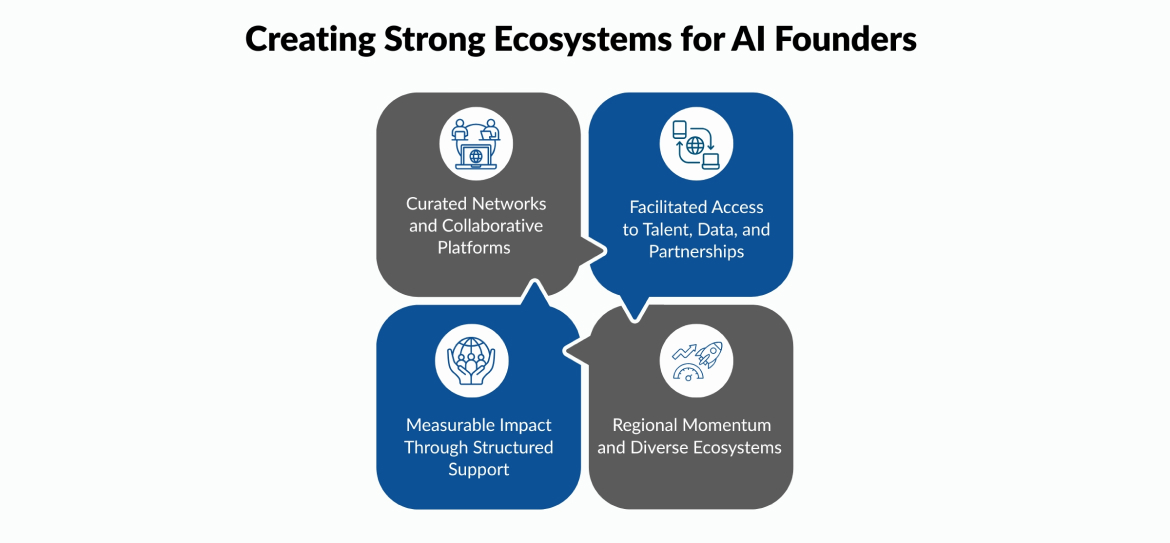Introduction
Artificial intelligence has moved from the margins of research to the center of global innovation, with AI venture capital driving much of that momentum. Instead of operating as passive financiers, modern-day venture firms are now actively defining the future of those who will spearhead the next wave of AI breakthroughs. They not only affect the type of ideas to be constructed, but also the thought process of future founders, teamwork with others, and innovation. This is the shifting role shaping entrepreneurs who will drive the next generation of smart technology.
Why AI Needs a Different Kind of Investor
AI cannot take the same path as conventional tech startups. It requires a longer horizon, more investment of capital, and leadership that goes way beyond financial measures than do consumer applications or SaaS tools. The AI venture capital firms are filling this void by providing strategic guidance that is specific to the industry problem.
According to research by the Boston Consulting Group, approximately 70 percent of generative AI projects remain in the pilot phase, hindered by challenges such as reliability and accuracy, which significantly delay or prevent scaling to operational status.
Key aspects that set AI-focused investors apart include:
-
Navigating high technical complexity: Founders tend to have steep learning curves, and technical knowledge can fill the knowledge gap on the part of an investor.
-
Addressing ethical dilemmas: Accountable leadership ensures that companies incorporate the need for transparency and fairness into their models.
-
Scaling and capital intensity: Enterprises based on AI require expensive computer infrastructure and skilled human resources, making resource-based support essential.
Funding to Founding: Shaping Entrepreneurial Mindsets
Venture capital during the age of AI is not merely a monetary driver, it is a driver of transformation by founders. Investors today actively cultivate resilience, strategic thinking, and adaptability in founders, not just bankable ideas.
How VCs shape founder mindsets:
-
Emotional Resilience and Adaptive Leadership: Recent commentary indicates that venture capital is now paying a lot of attention to the development of founders rather than technology. Emotional stability and being able to change direction in a decisive fashion are currently viewed as important success factors.
-
Personality Over Pitch: According to a large-scale study by Columbia Business School, founders high in openness and agreeableness are more likely to raise money, while founders showing traits like openness, conscientiousness, extraversion, agreeableness, and neuroticism, tend to succeed during early fundraising. Investors often bet on the persona of the founder before thoroughly analyzing the business plan.
-
Observation Over Assumption: Intelligent traders do not rely on technical specifications. They determine the way founders tell the story, how they remain composed during stress, and react to criticism- characteristics that suggest that they are willing to lead in uncertain situations.
Creating Strong Ecosystems for AI Founders
An ecosystem is not just a source of funds to start up projects. It opens the door, connects the dots, and speeds up the process. These supporting structures are being pushed forward by the modern-day AI venture capital:

1. Curated Networks and Collaborative Platforms
Venture companies design ecosystems in which founders can access researchers, mentors, and insiders. Such links drive profound teamwork, information exchange, and peer education, serving as a catapult to creativity.
2. Facilitated Access to Talent, Data, and Partnerships
Top investors open up to vital resources like proprietary data, expert engineers, and strategic affiliates. This access assists would-be founders to take shortcuts during the early stages and innovate more quickly.
3. Measurable Impact Through Structured Support
Organized support can assist AI founders in obtaining strategic advice and business model optimization, as well as gain access to essential resources, establishing better foundations that can enhance their long-term likelihood of successfully scaling.
4. Regional Momentum and Diverse Ecosystems
Recent data on a global level indicates that during the first half of 2025, private-capital funds centered on AI investments saw the United States and China jointly contribute about 75% of the total capital raised. Yet, new centers whether by magnified seed capital in cities such as Bengaluru or the increasing global connectivity, are turning both new locations into serious hot spots in the eyes of AI founders.
Access to Data, Talent, and Partnerships
The effects of venture capital today extend way beyond capital. In the age of AI, companies are enabling founders with tactical access to resources that accelerate growth. VCs are opening the doors to proprietary data that provides startups with a sustained competitive advantage. Over fifty percent of venture investors with an AI focus report that uncommon or rare data is what makes a startup special.
They are also innovative, spurring sources of talent. Investors can contribute to founding companies through established networks and assist founders in recruiting expert engineers, data scientists, and advisors to shorten the time to product development and scale.
Lastly, investors are bridges connecting startups to enterprise partners, as well as to corporate purchasers. With these introductions, prolonged negotiation cycles can be transformed into rapid, meaningful cooperation. One study found that AI startup corporate deals that used VC-facilitated connections closed in weeks rather than months.
Key contributions at a glance:
-
Data: Access to rare data sets that build defensibility.
-
Talent: Help recruiting mission-critical expertise.
-
Partnerships: Strategic introductions to customers and collaborators.
Ethics, Regulation, and Responsible AI Development
Due to the focus of artificial intelligence on innovation, the field of AI venture capital is defining how founders tackle the problem of fairness, accountability, and governance. In addition to assessing the business potential of startups, investors guide them in building trust and aligning with emerging standards. This is a necessity because regulatory environments all over the world are becoming stricter. Globally, more than 1,000 AI-related policy measures and legal frameworks have been proposed across at least 69 countries to tackle public concerns about AI safety and governance.
Responsible creation of AI implies that the founders are to balance between experimental fast fulfillment and ethics. Venture firms have come to demand responsible practices on behalf of a portfolio company during its inception. They are usually involved in:
-
Ethical frameworks: Relocate startups to introduce bias detection and transparency software and responsible data sourcing.
-
Regulatory alignment: Training founders to act within new regulations, including data privacy regulations and industry-related AI regulations.
-
Long-term responsibility: Enabling models of governance that make the results of AI explainable and auditable.
Conclusion
AI venture capital is not just funding, it is influencing the attitude, asset base, and virtue compass of the future generation of leaders. Investors are shaping the future of AI by helping its founders to become more resilient, introducing them to systems, and making AI a responsible practice. The founders of the future will not only shape the future of technology but also shape the principles and trends of whole industries that will leave a persistent mark on the history of innovation.







